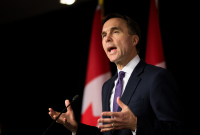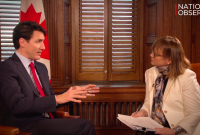Support strong Canadian climate journalism for 2025
“In a democracy, there is room for nonviolent civil disobedience.”
Thus Canada's Green Party Leader Elizabeth May explained why, on March 23, she had stepped in front of the entrance into the Kinder Morgan work area on Burnaby Mountain and deliberately sought arrest.
The injunction she breached by doing so had been requested by the Texas oil giant in order to facilitate its expansion of the Trans Mountain pipeline, allowing the flow of massive volumes of “dilbit” – short for diluted tarsands bitumen -- from Alberta to the Port of Vancouver for shipment to refineries overseas.
By endorsing this construction, the Government of Canada, once again, has failed to honour its commitment to push back against accelerating global climate change.
Prime Minister Justin Trudeau’s aggressive pursuit of this expansion of the tar sands has been widely endorsed by corporate CEOs across the country, but just as widely opposed by climate scientists and masses of ordinary citizens and citizen groups, not only in Canada, but around the world. That’s because tarsands bitumen is generally considered to contain the “dirtiest” fossil fuel in the world, generating more greenhouse gases than almost any other. Supporting its expanded extraction and use is a central feature of Canada’s laggard approach to addressing global warming, an approach chastised by federal Environment Commissioner Julie Gelfand as stuck in “endless planning mode.”
In the face of such sustained inaction by successive governments, it is clear that Elizabeth May, leader of a federal political party that expressly acknowledges the importance of the ecosystem in human survival, really had little choice but to take a very visible and public stand against this ill-advised project.
The judge in this case, B.C. Supreme Court Justice Kenneth Affleck, adopted a narrow and perfunctory stance towards her action, however. He raised the fine levied against May from the $500 he fined other defendants for the same charge to $1500, avowing that she had used her position of influence to sway others to do what she had done.
While deferential towards Justice Affleck in court, the Green Party leader pulled no punches in a brief speech outside the courtroom. She noted that Kinder Morgan had “made the government of Canada jump through hoops – they’ve forced something that I thought I’d never see, the finance minister saying we are prepared to underwrite a project that takes fossil fuels and exports them to other countries, violating the Liberal election platform.”
A certain prescience embodied in her remarks was revealed a few hours later, when a senior government official revealed that the federal finance minister had indeed reached an agreement in principle with Kinder Morgan to force the pipeline expansion through. Although the details of this arrangement are not yet released, it is clear that one way or another, substantial taxpayers’ money will be spent – either to compensate the oil giant for extra expenses caused by protests, or else to pay for the pipeline expansion directly.
It beggars belief that a sovereign government, on paper committed to play its part in a global race to address rampant global warming, will now enter into a contractual agreement with a flawed fossil fuel transporter – an agreement that will be reached behind closed doors thanks to a non-disclosure agreement sheltering Kinder Morgan and the government from public scrutiny.
The hoops that our national government is jumping through – apparently willingly – indicate an entirely unwholesome relationship.
By approving the Trans Mountain pipeline, and allowing corporations to rule in the courtroom against principled leaders like Elizabeth May, Justin Trudeau and Bill Morneau are moving Canada further away from the growing global consensus that climate change is a crisis that must be addressed.
That awareness is now leading increasing numbers of citizens around the world, impatient with politicians, to employ the law not to punish leaders like May, but to compel governments holding power to take concrete action against climate change. A report published a year ago by the United Nations Environment Programme, in collaboration with Columbia University’s Law School, notes that around the world, “citizens and nongovernmental organizations are suing to hold their governments accountable for climate-related commitments.”
As of March 2017, the report enumerates nearly 900 cases pushing for action on climate change that have been filed in 24 different countries, including an astonishing 654 in the USA, as well as 80 in Australia, 49 in Europe and 40 in Great Britain.
Four cases were singled out as “likely to make waves” and force governments to act responsibly. Three of these critical cases are in the Netherlands, Belgium and Peru, while an unusual fourth case was filed in 2015 in Oregon by 21 American youths, aged from 10 to 21 years old. The plaintiffs’ main argument, already affirmed by an Oregon District Court, states that “the government has known for more than 50 years that the carbon dioxide produced by burning fossil fuels was destabilizing the climate system in a way that would significantly endanger plaintiff’s, with the damage persisting for millennia.”
Canada had only 13 cases in process last year.
It's time for more. Massive displays of public dissent must be coupled with aggressive legal actions by ordinary citizens and public interest groups against provincial and federal governments and their corporate handlers.
Global warming is an issue that, for the first time in the history of this planet, compels every member of the human family to take concrete steps to help slow and hopefully reverse its relentless and destabilizing progression.
Fining public figures like May for making that point through public actions will not help to achieve that goal, no matter how heavy the fine.






Comments
I'm annoyed that May's fine was three times what the NDP member for Burnaby had to pay!!! Obviously, that judge doesn't know who the next federal government is going to be...lol, or that time may well be up for such blatant gender discrimination.
Still, if his triple standard where May is concerned, indicates a genuine fear of green copy cat arrests, we may be getting somewhere. It is true. There aren't any politicians of any stripe, on a dead planet. And no judges either.
Time for the 99% to step up.
I would like to know where to contribute to Ms May's legal costs--all of them.
Really? Awesome.
http://elizabethmaymp.ca/
Thank you for this clear and sentient response.